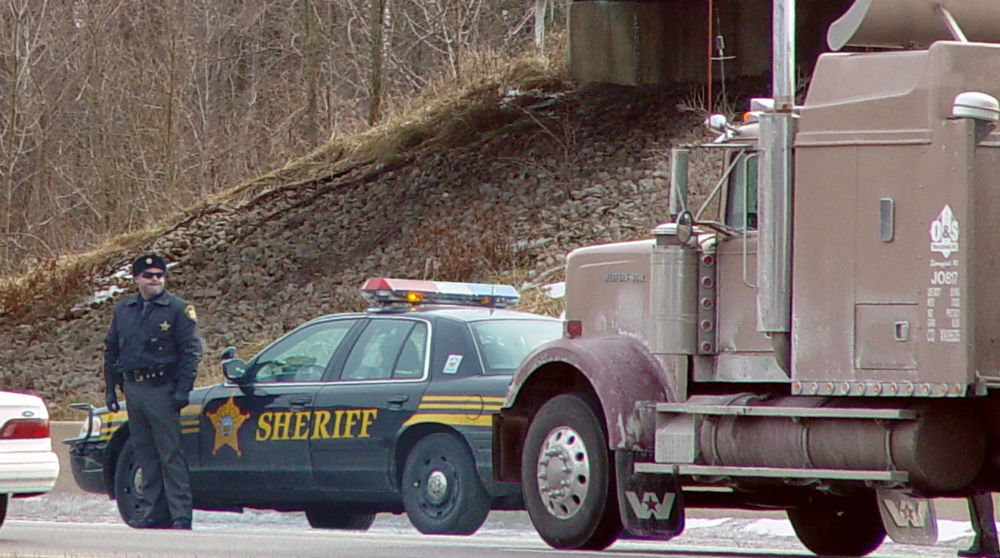
Truckers and Trauma
Peter Rosenberger
On Interstate 40 in west Tennessee, a young woman in a sedan sped past a group of truckers on November 18,1983. Maneuvering her car in front of the lead trucker, she stayed a bit out in front of him for a while on the long stretch of highway.
Minutes later, however, he noticed something different. Her car started weaving.
Swearing under his breath, he saw her head slump over on the steering wheel. Flashing his lights and honking his horn, he vainly tried to get her attention. Using his CB radio, he alerted the truckers around him of the impending danger. Another trucker pulled into the lane beside him; Together they formed a rolling barricade to keep other vehicles from getting near the now out of control driver—who raced ahead at 70 mph.
They Watched Helplessly
Continuing to flash lights and blare horns, they watched helplessly as she veered to the right. Mowing over a roadside marker, she horrifically collided with one of the concrete abutments flanking a bridge. The rear of the car launched into the air and the sedan flipped across the small ravine—slamming the trunk into the other side of the bridge’s supporting wall. The car then tumbled into the creek bed.
Ten semi-truck drivers pulled their rigs over while calling for help on their radios. Grabbing fire extinguishers, they leaped from their cabs and raced down the embankment to the now burning car.
Smothering the flames, they peered into the car to check on the young woman. Jaws tightened for some of them, and a few others grew nauseous at what they witnessed. With her body grotesquely pinned insider the car, blood poured from numerous wounds and multiple compound fractures.
Waiting for paramedics, a few truckers frantically worked to keep her alert by peppering her with questions. Coming in and out of consciousness, she tried answering all their repeated questions and they learned her name was Gracie Parker.
A Ministry of Presence
Working furiously to keep her alive and conscious, all assembled assured her of their presence.
“We’re here, Gracie”
“You’re going to be OK.”
“Help is on the way.”
“Hold on!”
The truckers used unscripted words and phrases that flow when help arrives at the scene of an accident—words of comfort and support to those in trauma.
Within minutes, the screams of ambulances could be heard racing towards the crash site. Paramedics took over and they gingerly extracted Gracie’s broken body from the car. As they made their way up the embankment, the truckers softly called out more supportive words to her. With tears flowing freely down their cheeks, they formed a solemn line.
None of the truckers possessed any formal paramedic training or medical skills. They simply ran to a burning car with fire-extinguishers.
Racing to the Fires
When we see someone trapped in the horrific wrecks and dumpster fires of sin, do we rush to them with fire-extinguishers, or do we add brush to the fire?
I’ve done both.
Hanging my own head, I see where those who rushed into my own wreck(s) were dishonored by my refusal to do the same for others.
Ministry often means rushing to the scene of a wreck. Speaking assuring words requires no seminary or ordination. All that we need to function in those moments are vivid mental pictures of two scarred hands reaching into our trauma.
Those truckers tried to warn and wake her, while protecting others. When the wreck happened, they called for help while running to a burning car to smother the flames. They never questioned or judged how she got there, they simply worked to get her to safety. Addressing the immediate priority, the truckers relinquished care to trained professionals.
They couldn’t possibly imagine God’s purposes for Gracie—even when it appeared hopeless or caused them to groan in nausea. They did what they could with what they had—even while tears streamed down their faces.
A Legacy
 Gracie lived. She bears deep scars and relentless pain from the accident. But she also brought two children into the world and now has two grandsons. As the purposes God has for her life continue to unfold, no small amount of gratitude is owed to ten truckers who comforted a wounded teen-aged girl bleeding out on the side of the road—to let her know that she wasn’t alone.
Gracie lived. She bears deep scars and relentless pain from the accident. But she also brought two children into the world and now has two grandsons. As the purposes God has for her life continue to unfold, no small amount of gratitude is owed to ten truckers who comforted a wounded teen-aged girl bleeding out on the side of the road—to let her know that she wasn’t alone.
Their model of rushing to ministry without judgment stands as a powerful model and legacy. Through every song Gracie sings, and through every prosthetic limb she provides to her fellow amputees, those truckers are still ministering to the wounded …and those who care for them.https://standingwithhope.com/truckers-trauma/



